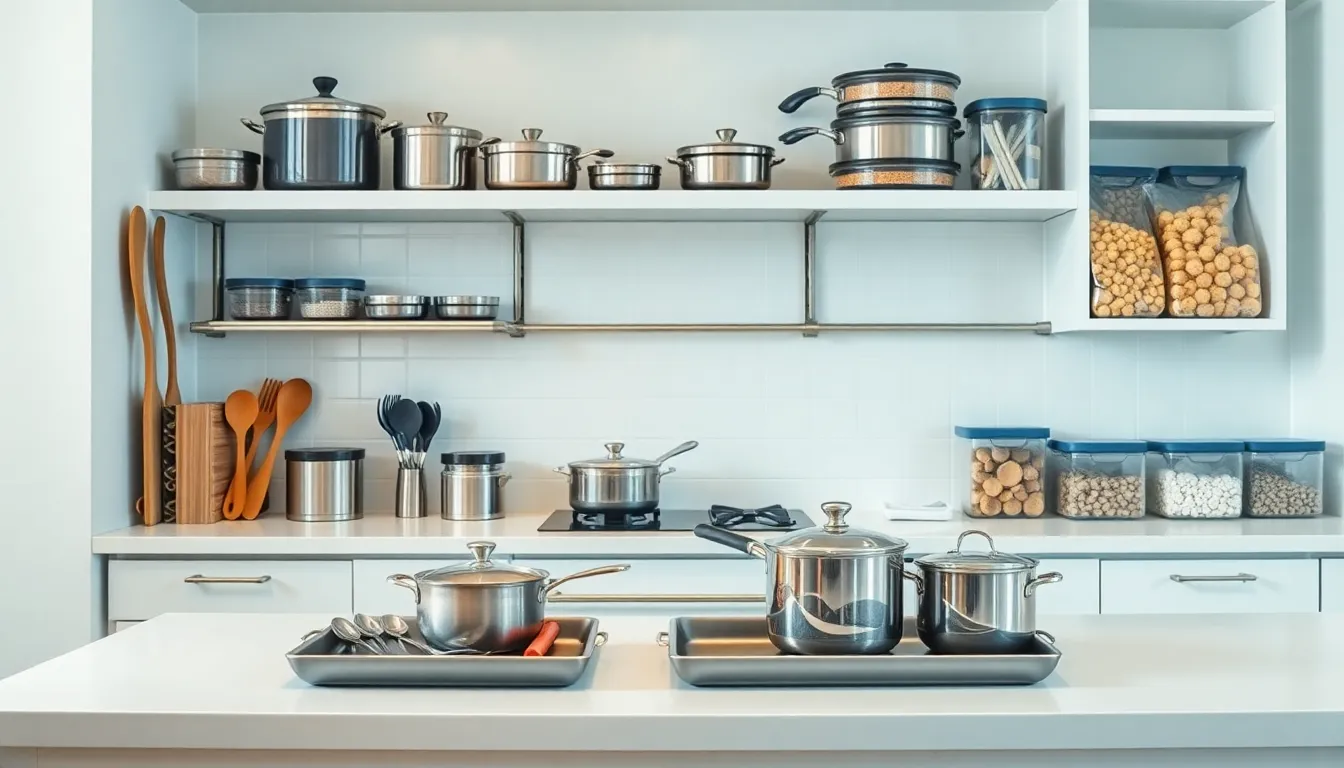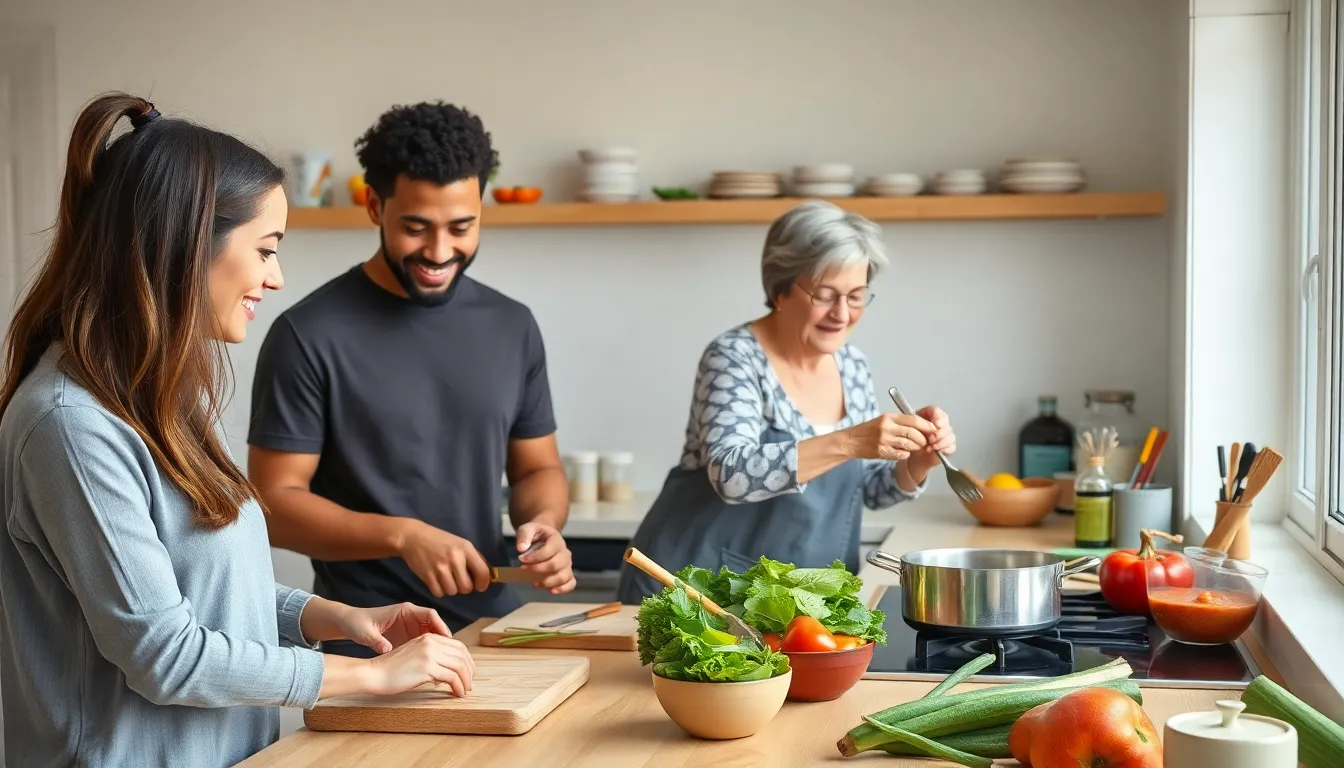In today’s fast-paced world, maximizing kitchen productivity is essential for anyone who loves to cook. Whether it’s a busy weeknight dinner or a weekend brunch, efficiency can make all the difference. With just a few smart strategies, anyone can transform their cooking space into a hub of creativity and speed.
From meal prepping to organizing tools, these kitchen productivity tips will help streamline the cooking process and minimize stress. By adopting these simple yet effective practices, home cooks can reclaim their time and enjoy the culinary experience without feeling overwhelmed. Embrace the art of cooking with newfound efficiency and watch as your kitchen becomes a joyful space for culinary exploration.
Table of Contents
ToggleEssential Kitchen Productivity Tips
- Plan Meals Ahead
Establish a meal plan for the week, outlining breakfast, lunch, and dinner options. This practice minimizes daily decision-making and shopping trips.
- Batch Cook
Prepare large quantities of meals, such as soups, casseroles, or grains. Store them in portions. This strategy saves time during busy weeknights.
- Organize the Kitchen
Group similar items, like spices or baking tools, in designated areas. An organized kitchen reduces the time spent searching for ingredients or equipment.
- Utilize a Timer
Set a timer while cooking to stay focused. Breaking tasks into manageable intervals enhances concentration and maintains pace.
- Pre-Chop Ingredients
Chop vegetables or measure spices in advance. Store them in containers to make cooking quicker and more efficient.
- Keep Essential Tools Accessible
Store frequently used utensils, pots, and pans within easy reach. This accessibility speeds up cooking processes during meal preparation.
- Clean As You Go
Tidy up the workspace during cooking to avoid overwhelming cleanup later. This habit maintains an orderly environment and enhances focus.
- Use Multi-Functional Equipment
Invest in appliances that serve multiple purposes, like a slow cooker or an Instant Pot. These versatile tools streamline cooking processes and reduce clutter.
- Set Up a Cooking Station
Create a dedicated area with all necessary tools and ingredients for each dish. This setup promotes efficiency by minimizing movement across the kitchen.
- Implement a Weekly Grocery List
Write a grocery list based on the planned meals. Regular shopping trips cut down on impulse buys, streamline stocking up on essentials, and improve overall kitchen efficiency.
Organizing Your Kitchen Space

Organizing kitchen space enhances workflow and makes cooking more enjoyable. Implementing proper strategies leads to greater efficiency and reduces stress in meal preparation.
Decluttering Your Countertops
Decluttering countertops increases space and functionality. Reducing unnecessary items creates a clear workspace for food prep. Here are some effective strategies:
- Remove non-essential items: Keep only frequently used appliances and tools on countertops. Store away seasonal gadgets.
- Use trays: Group similar items, like oils and spices, on trays for easy access. This method keeps things organized and visually appealing.
- Clear daily: Take a few moments at the end of each day to put items back in their designated spots. This habit prevents accumulation and maintains a neat environment.
Efficient Storage Solutions
Efficient storage solutions optimize available space, promoting a clean kitchen. Creative organization methods can help with maximizing storage potential:
- Vertical space: Utilize shelves or wall-mounted racks for pots, pans, and utensils. This method frees up cabinet space for other items.
- Clear containers: Store pantry items in transparent containers to quickly identify contents. This organization reduces time spent searching for ingredients.
- Drawer dividers: Use dividers in drawers to categorize utensils, kitchen tools, and gadgets. This organization prevents clutter and improves accessibility.
- Under-shelf baskets: Maximize shelf space by incorporating under-shelf baskets for small items. This additional layer allows for better organization without taking up extra space.
Implementing these organizing strategies creates an efficient kitchen environment that enhances productivity while cooking.
Meal Preparation Strategies
Effective meal preparation strategies significantly enhance kitchen productivity. Implementing these techniques can streamline cooking and create more enjoyable meal experiences.
Batch Cooking Techniques
Batch cooking allows cooks to prepare large quantities of food at once, saving time during the week. Selecting recipes that freeze well, like soups, stews, and casseroles, provides convenience. Cooking staple items, such as grains and proteins, in bulk simplifies assembling meals later. Packaging meals in portion-sized containers ensures easy access and helps manage serving sizes. Additionally, designating one day a week for batch cooking can establish a consistent routine and alleviate weekday cooking stress.
Utilizing Time-Saving Appliances
Time-saving appliances play a crucial role in enhancing kitchen efficiency. Slow cookers offer the advantage of meal preparation without constant attention, allowing for complexity with minimal effort. Pressure cookers speed up cooking times for beans, grains, and roasts while maintaining flavors and nutrients. Food processors simplify tasks like chopping, slicing, and pureeing, drastically reducing prep time. Using blenders also aids in creating smooth sauces or soups quickly. Investing in multi-functional appliances can consolidate efforts and reduce clutter, maximizing kitchen productivity.
Planning and Scheduling Meals
Planning and scheduling meals supports overall kitchen productivity. By organizing meal preparation, home cooks can minimize daily decision-making and enhance efficiency in the kitchen.
Creating a Weekly Menu
Creating a weekly menu simplifies meal planning and reduces stress. Home cooks can:
- Draft a Menu: Outline meals for each day, including breakfast, lunch, and dinner.
- Incorporate Variety: Use a mix of proteins, grains, and vegetables to keep meals interesting.
- Consider Seasonal Ingredients: Select fresh, seasonal produce to improve flavor and nutrition.
- Plan for Leftovers: Include recipes that yield extra portions for future meals, saving time later.
- Use a Template: Adopt a consistent structure for meals, such as Meatless Mondays or Soup Sundays, to streamline planning.
By following these steps, home cooks can create a structured and adaptable weekly menu that enhances kitchen productivity.
Time Management Tips
Effective time management boosts kitchen productivity and creates a more enjoyable cooking experience. Some strategies include:
- Set a Cooking Schedule: Allocate specific time blocks each week for meal prep and cooking.
- Prioritize Tasks: Identify high-impact tasks that influence overall meal prep, such as chopping vegetables or marinating proteins.
- Use Timers: Implement a timer for focused cooking sessions, enhancing concentration and efficiency.
- Batch Tasks: Combine similar activities, like washing and cutting vegetables, to minimize transitions between tasks.
- Limit Distractions: Avoid interruptions during meal prep by reducing phone notifications or involving family members in the process.
By applying these time management strategies, home cooks can improve productivity and streamline their meal preparation process.
Smart Cooking Techniques
Smart cooking techniques optimize time and resources in the kitchen. Utilizing effective methods can enhance productivity and create delicious meals efficiently.
One-Pot Meal Ideas
One-pot meals simplify the cooking process by minimizing cleanup and maximizing flavor. Here are some examples of one-pot meal ideas:
- Chili: Combine beans, meat, vegetables, and spices in a single pot. Cook for one hour for a hearty dish.
- Risotto: Sauté onions in olive oil, then add Arborio rice and broth. Stir occasionally until creaminess develops, usually about 30 minutes.
- Casseroles: Layer ingredients like pasta, sauce, and cheese in a baking dish. Bake at 350°F for 30-45 minutes until heated through and golden.
These dishes allow home cooks to prepare satisfying meals with minimal effort while reducing dishwashing time.
Quick Cooking Methods
Quick cooking methods contribute to faster meal preparation without sacrificing taste. Here are several techniques to consider:
- Stir-frying: Cook ingredients rapidly on high heat using a small amount of oil. This method retains nutrients and flavors and typically takes 10-15 minutes.
- Pressure cooking: Use a pressure cooker to significantly reduce cooking time. Foods like grains and meats often cook in one-third the time of conventional methods.
- Microwaving: Prepare vegetables and reheating pre-cooked meals in the microwave offers convenience. Many items cook in under five minutes.
- Broiling: Utilize a broiler for quicker cooking by placing food close to the heat source. This method cooks meats and vegetables in about 10-20 minutes.
Implementing these quick cooking methods enhances kitchen efficiency while ensuring flavorful results.
Maximizing kitchen productivity transforms the cooking experience into a more enjoyable and efficient endeavor. By adopting the strategies outlined in the article, home cooks can significantly reduce stress and enhance their culinary creativity.
Embracing meal prep, organizing tools, and utilizing smart cooking techniques not only saves time but also fosters a more organized kitchen environment. With these practical tips, anyone can elevate their cooking routine and make the most of their time spent in the kitchen. A well-planned and efficiently organized kitchen is the key to unlocking culinary potential and enjoying every moment of the cooking journey.




